Archive for July, 2023
Clinical rotation in the department of surgery in Bruneck, Italy
- Medicine
- Bruneck, Italy
- Università di Verona
- 03/2023 – 07/2023
1. Application/Finding an internhip
The preparation for my hospital internship in surgery was very smooth. I applied 7 months
before my stay at various hospitals throughout South Tyrol. I was able to find an internship for
the entire 4 months in Bruneck. Although everything worked out well I would recommend
applying earlier to be on the safe side. There was a dedicated contact person, Dr. Neumair, at
the hospital in Bruneck who handled communication with the University of Verona. She
ensured that everything was arranged for my stay. Working with her was extremely helpful and
reassuring, as it allowed me to focus on the professional aspects of my internship without
worrying about organizational matters. The International Office was also very helpful with my
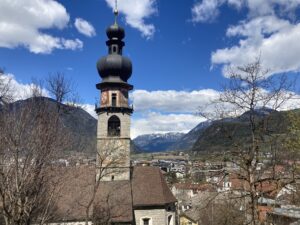
Bruneck
© Felicitas Weiß
Erasmus Plus application, providing clear guidance and prompt communication with the
respective contact persons. Their support made the process stress-free, enabling a rewarding
international academic experience during my hospital internship.
2. Accomodation & Living expenses
After a quick research on the internet (http://accommodationunibz.blogspot.it/) I was able to stay in a 5-person shared
apartment with other students from the University of Bozen. For 520€ per month I got a fully
furnished 17sqm room. The shared apartment had great common areas with a pool table and
Netflix account. There was also a laundry room and a cleaning lady who came every two weeks.
The accommodation was perfect and allowed me to have a pleasant stay during my internship.
There were also some cheaper rooms for subletting, but I preferred to live in a shared apartment
so I could connect with people who live in Bruneck and know the area.
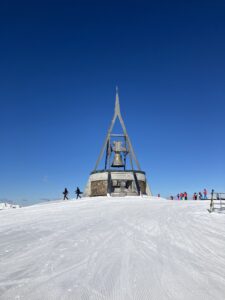
Kronplatz
© Felicitas Weiß
The cost of living in South Tyrol is comparable to Germany. Groceries are a bit more expensive.
However, public transportation is quite cheap and reliable. Most importantly, aperitivos are
cheaper than in Germany and are usually served with a small snack on the side!
3. The internship
My surgery rotation was an enriching and rewarding experience. Working in the general surgery
department provided a wide range of opportunities, from assisting in the operating room to
helping out in the outpatient clinic and the emergency department, known as “pronto soccorso”.
Everyone in the team was genuinely kind and welcoming, always ready to answer questions
and eager to receive assistance.
The hands-on experience was good. I was given the chance to examine patients, perform
ultrasound scans, and even practice suturing. The surgeons made me feel like a valued member
of the team. During quieter times in general surgery, I was encouraged to observe and assist the
orthopedic team.
The hospital staff must speak both Italian and German, so it is easy to communicate with them.
There are only a few patients who speak only Italian or Ladin. In these cases, the nurses
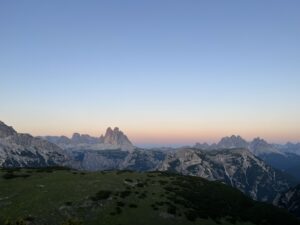
Zinnen-Blick
© Felicitas Weiß
translate, and after a while I picked up the common expressions and was able to use them
myself. If you are not from southern Germany, the South Tyrolean dialect can also be a bit
difficult at first, but you understand it with time.
My day started at 7:45 am and I usually stayed until 2:30 pm. Sometimes I could leave earlier
or had to stay longer to assist in the operating room, depending on what surgeries were coming
up. Besides me, there were five other students in general surgery and trauma surgery, so we set
up a rotation schedule so we didn’t have to come in every day or could leave early. Our schedule
also included weekend duty (on-call shifts). In return, we got two days off during the week.
A definite highlight was the cafeteria’s delicious meals. As students, we enjoyed complimentary
access to a variety of Primi Piatti, Secondi Piatti, a salad buffet, and delicious desserts.
4. Free time/tips
During my free time, I took an Italian language course at a language school to improve my
communication with patients. The course proved to be very helpful during my hospital
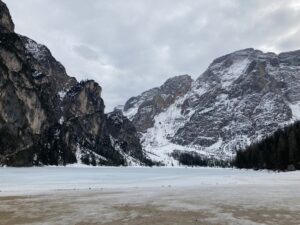
Pragser Wildsee
© Felicitas Weiß
internship and especially my travels afterwards and I would recommend doing one if you have
the chance.
When I arrived in March, the ski season was still in full swing, and with the Kronplatz as the
local mountain in Bruneck, it provided the perfect conditions for skiing. The snow-covered
slopes and breathtaking panorama made for unforgettable ski days. It was an excellent
opportunity to experience the beauty of the South Tyrolean mountains.
Later, I used my free time for extensive hikes to explore the nature of South Tyrol. The
surrounding landscapes offered a variety of hiking trails, lakes and summits. I strongly
recommend doing Piz da Peres and Peitlerkofel as well as a sunrise/sunset hike at Sambock.
In addition to exploring the local region, I embarked on exciting trips to some of Italy’s famous
cities. Venice, with its romantic canals and unique architecture, Verona with its impressive
Colosseum, and the fashion capital Milan were just a few of the captivating destinations. I also
visited Turin, Genova, Meran and the Garda Lake, each providing a different cultural diversity
and an immersive experience in the Italian way of life. It’s easy to reach those cities by train
and if you book in advance the tickets were very cheap.
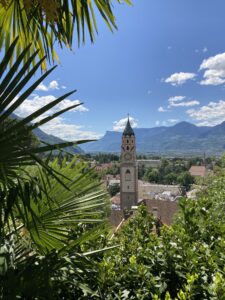
Meran
© Felicitas Weiß
The time spent with my roommates and my colleagues was also a highlight of my leisure
activities. We enjoyed the relaxed atmosphere of the aperitivo bars, went on great hikes, or even
paragliding together.
Overall, my leisure time during the internship was a perfect balance of active outdoor activities,
cultural explorations, and enjoyable camaraderie. The diverse opportunities the region offered
made this period an unforgettable and enriching experience during my time in the surgical
department.
5. Conclusion
In conclusion, my hospital internship in the surgery department was an incredibly enriching and
unforgettable experience. From the smooth preparation and comfortable accommodation to the
hands-on learning opportunities and supportive team, every aspect of the internship exceeded
my expectations. Additionally, exploring the beautiful landscapes, immersing myself in the
Italian language and culture, and forming lasting friendships with my colleagues made this
journey even more special. I am grateful for the knowledge and skills gained, and I will carry
the memories of this remarkable experience with me throughout my medical career.
Wonderful time in Vienna
- Medicine
- Austria, Vienna
- Universität Wien
- 03/2023 – 07/2023
1. Application/Internship search
My journey began 2 years ago, when I considered doing a tertial of my practical year abroad. I had already done an internship in gynaecology in Vorarlberg and really liked the system and the friendliness. Vienna was also not completely unknown to me from visits and so I decided to go to Vienna. Also, because it was a perfect fit with German as the national language and the hospital system is of a similar standard to Germany. So, I was able to find my way around quickly in my first few weeks and had no problems with a language barrier.
Now, it should be noted that you should plan early if you decide to go to Vienna. Places are in high demand and, with around 600 students a year from MedUni alo
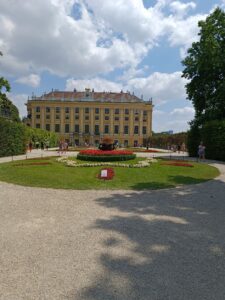
Schönbrunn Palace
© Lea Victoria Eckstein
ne, they are quickly filled. So, I started looking for a suitable hospital with the help of an online website and the PJ list of my state examination office. Ideally, it should already be recognised and a teaching hospital of the University of Vienna. That’s how I found the Franziskusspital Margareten, the former Hartmannspital. Maybe not outstanding in terms of size, but with its very own charm. I applied for a place in surgery, as this was one of the compulsory tertials in our PJ and relatively easy to complete abroad. I received positive feedback and was really looking forward to my time in Vienna.
The waiting time seemed long. Especially because the last information and documents were only sent shortly before the start. Not to mention that there were still problems with the recognition, because the “Landesprüfungsamt” requires a separate document for foreign tertials, which the University of Vienna does not sign. Instead, they issued a different document, which fortunately was recognised after a few exchanges of emails from the university PJ coordinators. Now, hopefully, nothing stood in the way of my stay, and I thought about suitable accommodation, travel health insurance and my financial situation. Since the practical year is generally not very well paid, I looked for options. I found an online article about the possibility of applying for an Erasmus+ scholarship, which was to be awarded specifically for internships. So, I tried my luck, and it took quite a bit of written arrangements, various emails and 2 application processes, but it was worth it. In January, 2 months before my stay abroad, I received feedback that my internship would be funded by the Erasmus+ programme of my university and that the University of Vienna also accepted my application within this framework and enrolled me as a temporary student.
This meant that I could register as a student in Vienna and received benefits such as the semester ticket, which allowed me to use public transport at very low cost from February to June. I was in contact with the International Office, which was very friendly and helpful. In Vienna itself, I made an appointment to clarify the final formalities. Beforehand, the entire application process and the document transfer took place via an online portal. This was uncomplicated and accompanied me until the end of the internship.
2. Accommodation & cost of living
Now the search for accommodation began, which I started relatively late, as a previously arranged accommodation through friends was not available in the end. In retrospect, this turned out to be fortunate. Just over a month before my trip, I started looking for a suitable room in a shared flat for the limited period. I simply used “wggesucht.de”. At first, it seemed quite difficult. There were a few ads, but only rarely did anyone respond to the request. But I was lucky, and a flat-sharing community contacted me. It was in the 3rd district and my job was in the 5th district. I could walk to work in half an hour or even faster by bus or tram. This seemed perfect and I was happy when I got an acceptance letter. Moreover, the price for the 10m^2 room with bunk bed was only 316€. It must be said that there is a much larger proportion of social housing in Vienna, which the city has subsidised and where the rents have remained cheap. That means you could get a bargain or two. However, the “normal” prices of the shared rooms tended to be much higher, around 500-600€.
On top of my rent, I had to pay my own monthly costs for various insurances, mobile phone tariffs and Spotify, as well as my old-age provision. That added up to quite a lot every month (about 280€).
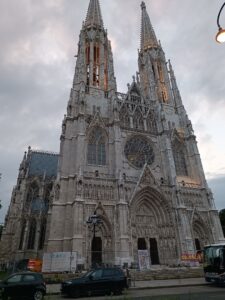
Votiv Church
© Lea Victoria Eckstein
And of course, there’s food, which is already more expensive here in Austria than in Germany. Inflation has made it even more expensive, but it was still a bit of a shock for me when I went shopping at Hofer/Aldi and spent about €50 on a normal weekly shopping trip instead of €25 (before inflation, admittedly). So, I spent about 200-250€ a month on food. All in all, I spent about 900€ a month. Then there were the leisure activities, and especially the months when visitors came, the monthly expenses were already over 1000€. All in all, Vienna is average, I would say, if you can find cheap accommodation. But the leisure activities can increase the expenses quite a bit, depending on how much you want to indulge yourself and how much you can. I also had a loan as a backup that I could fall back on. That’s something everyone must decide for themselves. Even though I would have liked to do without it altogether, I also needed the security to bridge the intermediate phases of the tertials.
3. Everyday life/internship
In March 2023, I started my journey with the DB to Vienna, whereby I planned some lead time for the bureaucratic things. I planned the registration with the city about 2 weeks before the trip and reserved an appointment. The same went for the International Office. That way, I was able to work through everything smoothly during my first few days in Vienna. I received a warm welcome from my shared flat and was able to settle into my room and explore the area very quickly.As my internship, I typically started my workday at 7am with the morning meeting. This meant I had to get up at just before 6 to get ready and get going on time. My way to work took me past Belvedere Palace, through long house canyons and across a playground to my hospital, which is integrated in the middle of a house block. There I was assigned my respective task in the morning. At the beginning, this consisted mainly of assisting in the operating theatre. But since the team was small overall, I was able to be a 1st assistant very often and learned how to sew in my time. I usually worked alone with a senior doctor at the table or also with a 2nd assistant. Otherwise, I worked on the ward and made admissions, went on rounds, helped the residents, and talked to the patients after the operation. On days when I didn’t have a fixed schedule, I was also able to go to endoscopy or special outpatient departments. Despite the small surgery, the spectrum was relatively broad because of the many affiliated doctors who came to the hospital to operate. There were orthopaedic, neurosurgical, and ophthalmic surgeries, for example, in which we worked rather subordinately. But there were also mamma operations and thyroid operations in addition to general surgery. So, I gained a relatively broad insight into surgery. Even though, of course, major operations and trauma
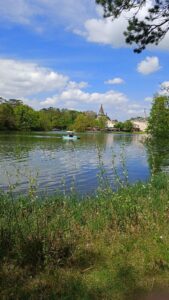
Laxenburg Castle
© Lea Victoria Eckstein
surgery were missing. However, this was made up for by the atmosphere. For me, the official end was at 1 pm plus a half-hour lunch break and 1 hour of self-study. Here in Austria, an hour of self-study is part of the working day for students. However, there were also days when I stayed longer in the operating theatre to help with an operation or to take some pictures on the ward. Afterwards, I went straight to the city or back home.
The team was very nice overall. I was integrated immediately and got my own phone, a locker and someone was always ready to explain things or let me try things out myself. In the operating theatre, the staff were very courteous and the atmosphere during the operations was relaxed to humorous, depending on the day. You could go to all the senior doctors at any time and especially to the head medical secretary in charge, who always had an open ear and with whom you could also talk about wishes for days off or holidays without any problems.
4. Free time/tips
In addition to work, there was also plenty of free time, and sightseeing was not neglected. Vienna is simply a beautiful city. Everywhere you look you see house facades with stucco or ornaments. The city simply has its very own flair. The big buildings like Sissi’s Hofburg, Schönbrunn Palace or St. Stephan’s are the most typical tourist destinations. But through my longer time in Vienna, the beautiful parks also won my attention. When winter gave way to spring, everything started to blossom and for such a big city, Vienna really has a lot of beautiful green spaces and parks all over the place. Even from my flat you had a view of a smaller park from the balcony. However, my personal highlight during my time was the Danube Island. I was particularly taken with it, because it is simply a very long island in the middle of the Danube surrounded by water and yet the big city. A piece of dysentery in the middle of the stress. It can even be reached by underground line U1 and is especially popular at weekends for cyclists, hikers, walkers, families, and students. It offers small restaurants, paved paths, access to the Danube for swimming, volleyball courts and barbecue areas. And of course, there is a lot of meadow and sunbathing areas where, in good weather, the most diverse groups spread out on blankets, but also individuals who just want to enjoy the sun. During my stay, the annual Danube Island Festival also took place where I could hear Felix Jaehn and Silbermond live. Apart from that, Vienna is just incredibly diverse. There is so much gastronomy and especially coffee houses, which are very popular and where you can eat typical Viennese specialities. The famous “Sachertorte” at Café Sacher or an Esterhazy slice at Gerstner’s? I recommend the Sacher cake at the “Hofzuckerbäckerei Demel”. It’s a little more tart and chocolaty to my taste. But everyone has their own taste:)
As for entertainment, there is so much to choose from that I often couldn’t decide what exactly I wanted to see. The many museums, but especially the theatre performances/the ballet/the musicals/the operas really appealed to me. With the Ticket Gretchen app, I was able to register as U27 and benefited from many offers and incredibly cheap tickets. For example, I was able to book a ticket for the Burgtheater and the Volksoper for €10-12 on certain dates in every seating category. I sat in the balcony with a direct view of the stage for a Shakespeare play or in the second row in front of the orchestra pit for a musical. Concerts in St. Stephan’s Basilica or dance evenings could also be attended at low cost.
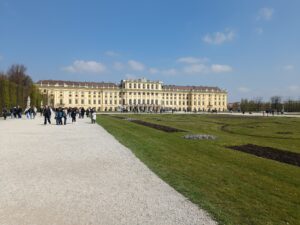
Schönbrunn Palace
© Lea Victoria Eckstein
As soon as I had visitors, I always went either to the State Opera, the Volksoper or to some other event. I wanted to experience most of the cultural offer. And it was worth it and can be recommended for anyone who is U27.
In May, the Vienna Festival Weeks started, with fairs, festivals and wine/beer festivals lined up on the weekends. There was not a weekend without a programme. And in some cases, admission was completely free, and you could just stroll through and enjoy.
5. Conclusion
Overall, I had an incredibly wonderful time in Vienna. And I would do it again every time. Both the work was fun, but also the city won me over. Seeing how summer comes to Vienna, how the parks become greener, how you can explore nature and the hiking trails in the surrounding area and still be able to enjoy the advantages of a big city with all its culinary and cultural offerings was a dream that I was able to fulfil. Thanks to the Erasmus funding, among other things, I was able to enjoy a few things without having to turn over every euro. I am very grateful for that.
Internship in Milan
- Governance of Technology and Innovation, MA
- Italy, Milan
- Politecnico di Milano
- 04/2023 – 06/2023
Application/Finding an internship
The search and application for the internship was relatively easy for me. Both RWTH Aachen University (RWTH) and Politecnico di Milano (PoliMi) are partners within the IDEA League network, which supports research stays at collaborating universities. The first prerequisite was to find a researcher who could supervise me during my stay. I had previously met my supervisor in person at an IDEA League Summer School. The fact that we already knew each other personally made it much easier for me to get in touch. He warmly welcomed the idea. It was more difficult when I subsequently contacted the host institution for my endeavor. At first, I received a rejection saying that PoliMi, the School of Design respectively, would not accept any interns or visiting scholars on a master’s level. After contacting the IDEA League representative of RWTH, who immediately got in touch with PoliMi, my research stay was eventually approved. First, I applied for the IDEA League Research Grant, but I got rejected. However, this didn’t affect the approval of my research stay. I was then advised to apply for funding through Erasmus+. I was pleasantly surprised by how quick and easy it was to apply for an Erasmus+ traineeship. In the end, my application was accepted, and I was thankfully awarded the Erasmus+ grant. Initially, I applied for two months, but I quickly realized that I would like to extend my stay by another month. This went smoothly and very uncomplicated. So, if plans change, even at short notice, it is possible to adjust them via Erasmus+. I would advise everyone to start very early with the application. I started 6 months in advance, but you underestimate how long an application process, in my case even two, can take.
Accomodation & Living Expenses
The search for suitable accommodation in Milan confronted me with great challenges. First, I searched for flats and shared apartments on popular websites like idealista. My relatively short stay of only a few months as well as my arrival in the middle of the semester made the apartment search even more difficult. After a long search, I found a shared flat via spotahome, a website for short and medium-term stays. I would only consider portals like spotahome or dovevivo if nothing else can be found, as bookings always come with additional fees and costs. The housing market in Milan is complicated. It is very difficult to find anything and certainly not at prices that are reasonable for students. There are reasons why numerous students are protesting these conditions by living in tents on campus. Therefore, it is not uncommon to share rooms in Italy. Although I was initially put off by the thought of almost completely giving up privacy, I ultimately decided to share a room as well. It was far less bad than I thought, but of course it depends a lot on who you get as roommates. And you usually don’t know that when you book a room through websites like spotahome. Not only the cost of housing, but also the cost of living is quite high in Milan, even by German standards. Milan is one of the most expensive cities in Italy and you should be aware of that. Not only restaurant visits, but even the cost of weekly grocery shopping is quite high. Usually, somewhat higher than in most major German cities. In retrospect, I am glad I saved on rent so I could at least live relatively comfortably without getting into financial trouble.
Everyday life/ the internship
I enjoyed the research stay very much. PoliMi is a prestigious institution, the facilities are remarkable, my research group called META was small but full of interesting and nice people who welcomed me warmly and supported me in all my needs. My workplace was on the Bovisa campus, just outside the city center. The campus is home to design students of all kinds. It is colorful, flashy, and bursting with creative people. It was a pleasure for me to come to the campus daily. As I came to PoliMi as a visiting scholar, the internship was not an internship in the traditional sense. As a visiting scholar, you are more independent and usually conduct your own research, but you are allowed to use the facilities and infrastructure on site, for example in the form of office spaces or the library. Since my master’s thesis is coming up, I was able to do a lot of research and collect data here. I also benefited from being able to collaborate and exchange ideas with researchers from similar fields. I assisted my colleagues by working together on projects and events. Hardly any day was like another, which made my stay even more varied and interesting.
Free time/tips
As far as everyday life is concerned, Milan has an incredible amount to offer. You can find everything your heart desires. Whether cultural institutions, sports, music events, restaurants, or festivals. Milan is a vibrant city. Moreover, Milan is very well connected within Italy. Therefore, it is easy to get pretty much everywhere from Milan. I took advantage of this and can highly recommend everyone to do the same. Italy is a beautiful country rich in culture and history. Additionally, Italy has hands down the best cuisine. There is certainly something for everyone.
The first tip is to get your Codice Fiscale early on. The Codice Fiscale is a tax identification number, but it is used for all kinds of contracts. Since I was not going to earn any money in Italy, I thought I would not need it. I was wrong though. I needed it for the rental contract and for a three-month card for public transport in Milan. The Codice Fiscale can be applied for at the Italian embassy in the state where you have your registered residence. The process may take several months. Another tip is to seek an exchange student status. I was offered the status as part of my application, but I declined because I did not think it was necessary. It was not mandatory, but the status would have given me access to the Erasmus student network, which would have allowed me to participate in numerous field trips, events, and parties. Obtaining exchange student status through the IDEA League is also relatively straightforward. If I had known this beforehand, it would have made it much easier for me to connect with exchange students. The third tip is to learn basic Italian. This becomes especially clear the further south you go in Italy. In the university context, English is not a problem at all, and it is also understood in many parts of Milan. In everyday life, however, it often comes in handy to have at least a rudimentary knowledge of Italian. Although Italians are warm and open to people from abroad, in my experience they are delighted if you at least try to speak the local language. My final tip is discounted tickets to cultural institutions. If you are an EU citizen and under the age of 25, you can get tickets at many cultural institutions at greatly reduced rates. Whether it’s the Last Supper in Milan, the Uffizi in Florence or the Museo die Capodimento in Naples. With an entrance fee of 2 euros, you don’t have to think twice about going to visit them.
Conclusion
All in all, I am very satisfied with my stay. It was different from what I expected, but I enjoyed it a lot. I met great people, was able to broaden my horizon and experience the Italian way of living. PoliMi is an excellent institution, and I was honored to spend a few months there. Moreover, Milan has much more to offer than just fashion. It is a vibrant big city with lots of possibilities. Looking back, I would do a few things differently. I would apply for an exchange student status and would start looking for housing earlier. In hindsight, however, one is always smarter. That is why I am happy to share my experiences so you can learn from my mistakes and get even more out of your stay in Milan. Nevertheless, I had a great time and would choose to stay at PoliMi anytime.

